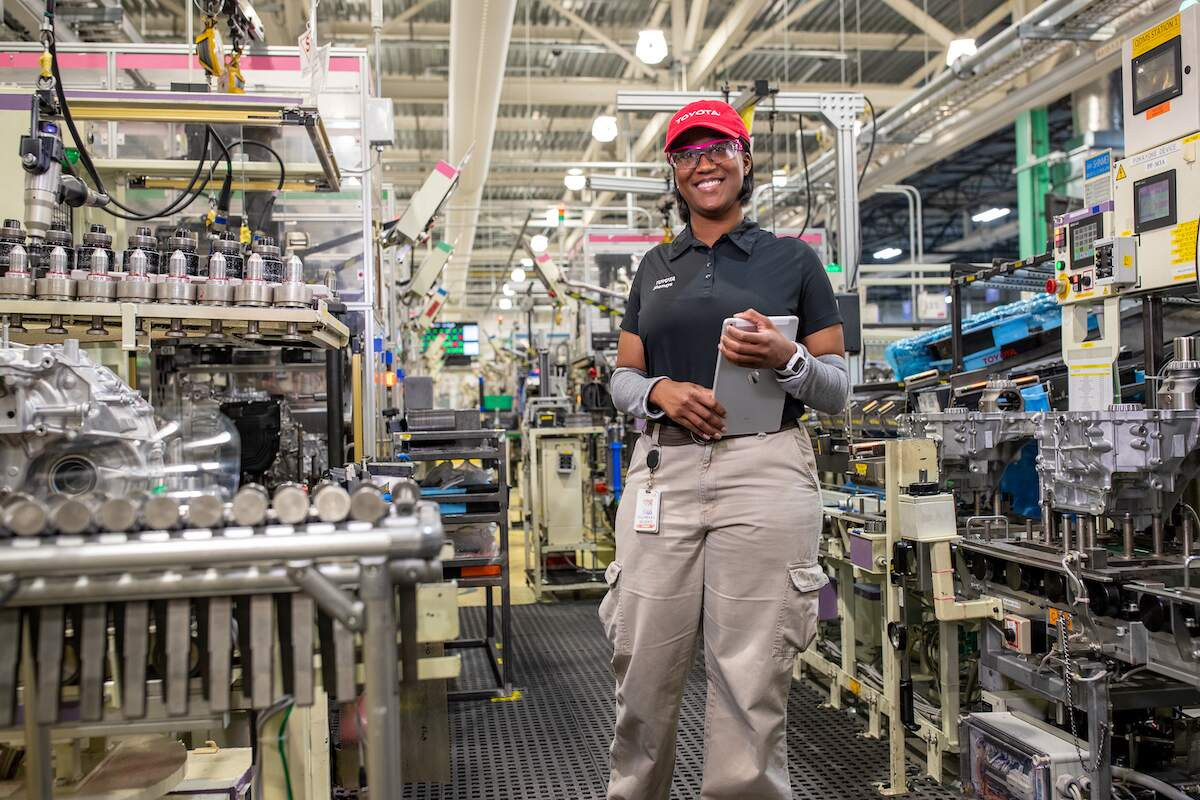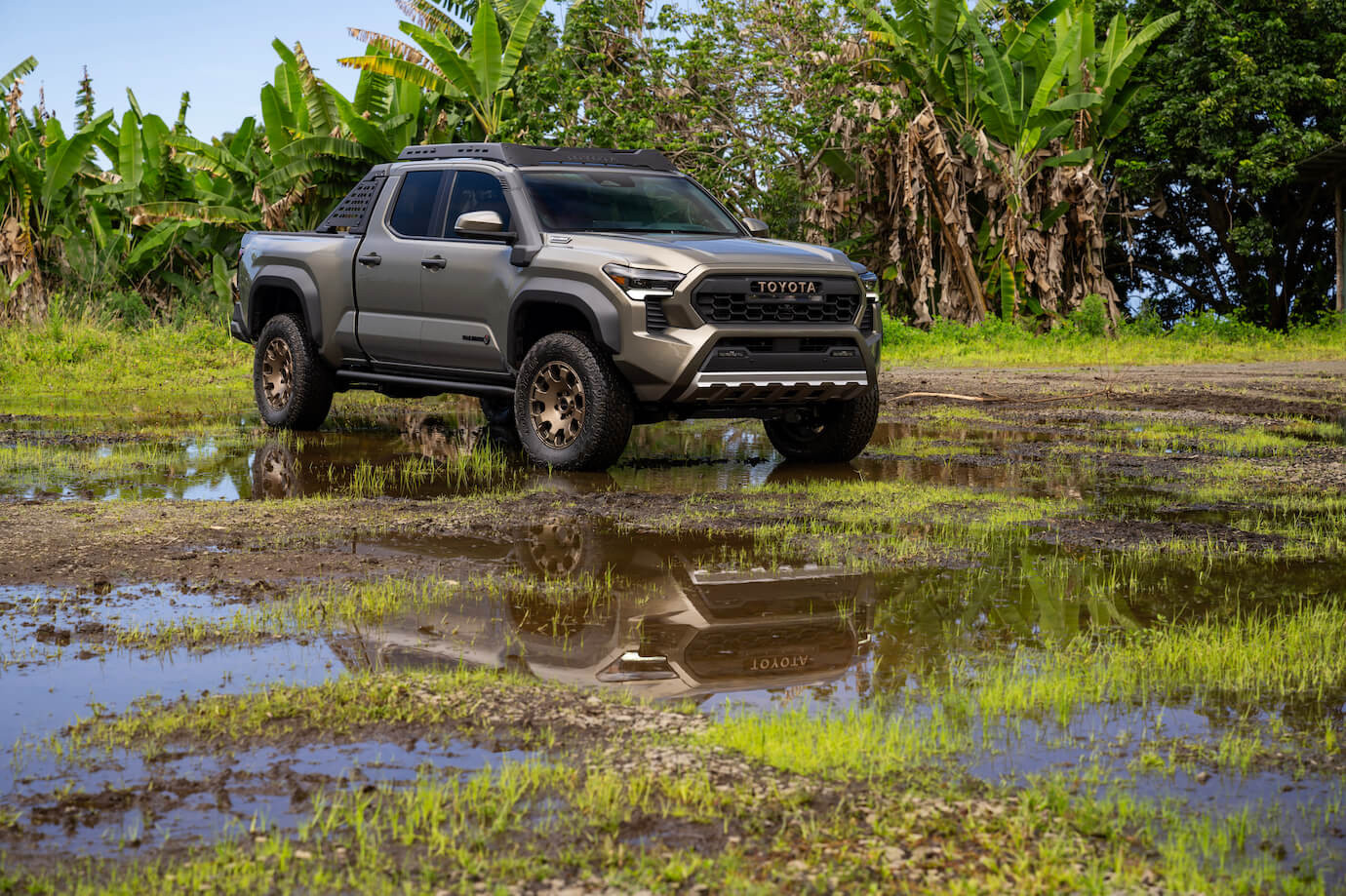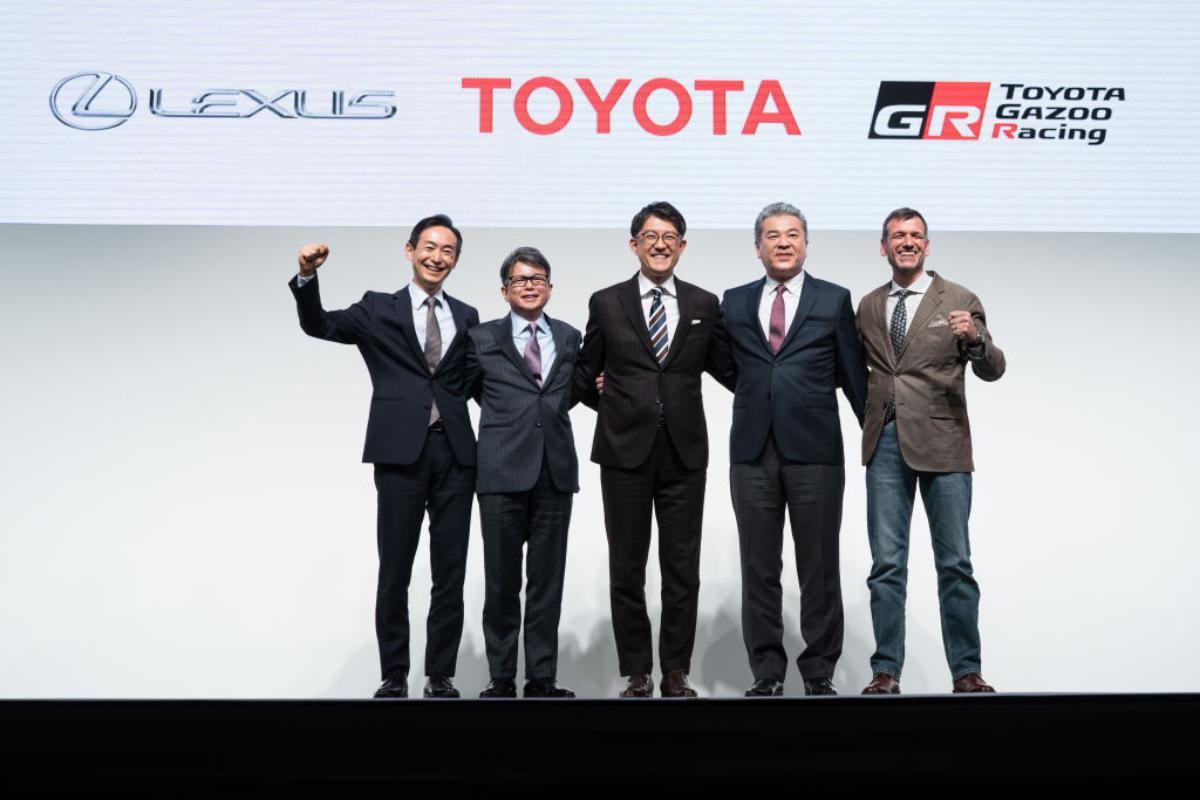How long does it take to build a Toyota car? On average, it takes Toyota around 21 hours to assemble a car from start to finish, ensuring top-notch quality and reliability, and at millertoyota.net, we value that commitment to excellence. For Boise, Idaho residents looking for a reliable and meticulously crafted vehicle, understanding the Toyota production timeline highlights the dedication to quality you can expect when choosing Toyota, and we have the models to fit your lifestyle. Discover the difference dedication makes and explore the available options like flexible financing, robust service, and a wide selection.
1. What Is The Average Time To Build A Toyota?
On average, it takes Toyota about 21 hours to build a car from the ground up. This timeframe doesn’t include the initial design and development phases, which can take significantly longer due to various factors, but it showcases the efficiency and precision of Toyota’s manufacturing process.
The time it takes Toyota to build a car can vary based on several factors. Designing a new vehicle can take years because of changing consumer behaviors, difficulties in securing parts, and resource constraints. Once the building process starts, a base model without add-ons can roll off the production line in about 18 hours, according to Car Care Portal.
For those in the Boise area considering a new Toyota, understanding this production timeline can highlight the dedication to quality and efficiency that Toyota brings to every vehicle. This means that when you purchase a Toyota from millertoyota.net, you’re not just getting a car, but a product of meticulous craftsmanship and attention to detail. Miller Toyota in Boise is committed to providing a wide range of vehicles that meet these high standards, ensuring reliability and customer satisfaction.
2. What Is The Typical Car Building Process?
 Robots assemble panels around the vehicle's frame at Toyota factory
Robots assemble panels around the vehicle's frame at Toyota factory
The typical car building process involves several key stages, starting with parts inspection and ending with final quality checks. Toyota cars typically have about 30,000 parts that need to be assembled, and each part is inspected for quality before arriving at the factory.
Here’s a detailed breakdown of the process:
- Shaping and Stamping Body Panels: The process begins with shaping and stamping the body panels to form the car’s exterior.
- Robotic Assembly: Robots then assemble these panels around the vehicle’s frame, ensuring precision and consistency.
- Part Attachment: The car proceeds along the production line, where various parts are securely attached.
- Painting: The painting process comes next, including applying chemical formulas to preserve the car’s exterior color and protect it from the elements.
- Interior Installation: After the paint dries, workers temporarily remove the doors to install interior components by hand, ensuring a high level of detail and quality.
- Tire and Mechanical Component Installation: The vehicle’s tires and mechanical inner workings are then installed.
- Performance Inspection: The structure and engine performance are inspected to ensure they meet Toyota’s standards.
- Electrical and Tech Check: Factory workers confirm that all electrical components and technology features function correctly.
- Final Inspection: After passing all checks, the car is prepared for shipment to a dealership or directly to the consumer.
This detailed process ensures that every Toyota vehicle meets high standards of quality and reliability. At millertoyota.net, customers can explore a variety of models that have undergone this rigorous manufacturing process, ensuring they receive a dependable and well-crafted vehicle. Miller Toyota in Boise prides itself on offering vehicles that reflect Toyota’s commitment to excellence, providing customers with peace of mind and satisfaction.
3. What Factors Affect Toyota’s Car Production Time?
Several factors can influence the time it takes for Toyota to produce a car, ranging from design complexities to supply chain logistics. These factors can either expedite or delay the manufacturing process, affecting the overall production timeline.
Here’s a breakdown of the key factors:
- Initial Design and Development: Designing a brand-new vehicle can take years due to changing consumer behavior, problems securing parts, or a lack of resources. This initial phase involves extensive research, prototyping, and testing, all of which contribute to the overall timeline.
- Model Complexity: Higher trim levels with premium paint colors, accessories, and other options take longer to produce. Customization and additional features require more time on the assembly line.
- Parts Availability: Securing the necessary parts can sometimes cause delays. With approximately 30,000 parts required for each car, any shortage can slow down the production process.
- Assembly Plant Capacity: The efficiency and capacity of the assembly plant play a crucial role. Plants working at full capacity can produce vehicles more quickly.
- Quality Checks: Additional quality checks, especially for exotic or specialized cars, can extend the production time. Toyota’s commitment to quality means that each vehicle undergoes rigorous inspection at various stages of production.
- Technology Integration: The inclusion of advanced technology features, such as sophisticated infotainment systems and safety technologies, requires more time for installation and testing.
For customers in Boise, Idaho, understanding these factors can provide insight into why certain models or customizations may have longer lead times. At millertoyota.net, we strive to keep our customers informed about the production timelines and ensure transparency in our processes. Miller Toyota in Boise is dedicated to providing accurate information and helping customers make informed decisions about their vehicle purchases.
4. How Does Toyota Maintain Quality During Production?
Toyota maintains its reputation for high-quality vehicles through rigorous quality control measures implemented throughout the entire production process. These measures ensure that every vehicle meets Toyota’s stringent standards before it leaves the factory.
Key strategies Toyota employs to maintain quality:
- Parts Inspection: All 30,000 parts that go into a Toyota vehicle are thoroughly inspected for quality before they even arrive at the factory. This ensures that only the best components are used in the assembly process.
- Robotic Precision: Robots are used to assemble body panels and other critical components with high precision, minimizing errors and ensuring consistency.
- Manual Installation: Skilled workers install interior components by hand to ensure attention to detail and a high level of craftsmanship.
- Performance Testing: The structure and engine performance of each vehicle are rigorously tested to ensure they meet Toyota’s performance standards.
- Electrical and Technology Checks: All electrical components and technology features are tested to ensure they function correctly and reliably.
- Continuous Improvement (Kaizen): Toyota embraces the philosophy of Kaizen, which emphasizes continuous improvement in all aspects of the production process. This helps identify and address any issues quickly and efficiently.
- Employee Training: Toyota invests heavily in training its employees to ensure they have the skills and knowledge needed to perform their jobs to the highest standards.
 The painting process at a Toyota factory ensures the exterior color is preserved.
The painting process at a Toyota factory ensures the exterior color is preserved.
By implementing these strategies, Toyota ensures that every vehicle that rolls off the production line is of the highest quality. For customers in Boise, Idaho, this means that when they purchase a Toyota from millertoyota.net, they can be confident that they are getting a reliable and well-built vehicle. Miller Toyota in Boise is committed to upholding Toyota’s reputation for quality and providing customers with vehicles that they can depend on for years to come.
5. How Does Toyota’s Production Time Compare To Other Automakers?
Toyota’s production time is competitive compared to other automakers, reflecting its efficient manufacturing processes and commitment to quality. While exact times can vary, Toyota generally aims for a balance between speed and thoroughness.
Here’s a comparison:
- Average Production Time: JVIS USA reports that automotive plants might take 18 to 35 hours to manufacture a single car. Toyota’s average of around 21 hours aligns with this range, indicating typical efficiency.
- RAV4 Production: According to Axle Addict, Toyota might take only 11 hours to produce a RAV4 base model with standard equipment, showcasing the company’s ability to expedite production for certain models.
- Customization Impact: The average timeframe for building a vehicle with moderate customization is about 17 to 18 hours, which is consistent with Toyota’s approach to balancing production speed with customization options.
Toyota might spend slightly more time building its cars compared to some other automakers, the results typically yield excellent products. This is evident in the upscale interior designs and top-notch build quality in models like the top-selling Toyota Corolla. The compact car is also massively popular worldwide, so buyers see the value of meticulous construction. Even a “bare-bones” Toyota has plenty of tech features, and more technology means more time in the inspection process.
For customers in Boise, Idaho, choosing a Toyota from millertoyota.net means investing in a vehicle that benefits from Toyota’s commitment to quality and meticulous construction. Miller Toyota in Boise is dedicated to providing customers with vehicles that offer both reliability and satisfaction, ensuring a positive ownership experience.
6. Why Does Build Quality Matter in Toyota Vehicles?
Build quality is paramount in Toyota vehicles, influencing their reliability, longevity, and overall customer satisfaction. Toyota’s commitment to superior build quality translates to numerous benefits for owners.
Here’s why build quality matters:
- Reliability: High build quality means fewer defects and a lower likelihood of mechanical issues, resulting in a more reliable vehicle.
- Longevity: Toyota cars are known for their long lifespans, often approaching 300,000 miles with proper maintenance, thanks to their solid construction.
- Safety: Meticulous construction enhances vehicle safety by ensuring that all components function as intended and provide maximum protection in the event of a collision.
- Resale Value: Vehicles with excellent build quality tend to hold their value better over time, providing owners with a higher return on investment.
- Driving Experience: A well-built vehicle offers a more refined and enjoyable driving experience, with less noise, vibration, and harshness.
- Reduced Repair Costs: Because Toyota cars are built solid, owners won’t have to spend as much on repairs, saving money in the long run.
 Toyota cars are known for their long lifespans and reliability
Toyota cars are known for their long lifespans and reliability
For customers in Boise, Idaho, choosing a Toyota from millertoyota.net means investing in a vehicle that prioritizes build quality, ensuring a dependable and satisfying ownership experience. Every minute spent building a Toyota makes the vehicle safer and more satisfying. Miller Toyota in Boise is committed to providing customers with vehicles that offer long-term value and peace of mind, backed by Toyota’s reputation for excellence.
7. How Does Customization Affect The Time It Takes To Build A Toyota?
Customization plays a significant role in the time it takes to build a Toyota, as each additional feature or upgrade requires extra time for installation and quality checks. The more a vehicle is customized, the longer it will take to complete the production process.
Here’s how customization affects build time:
- Additional Features: Higher trim levels with premium paint colors, accessories, and other options take longer to produce. Each additional feature requires careful installation and testing.
- Complex Installations: Advanced technology features, such as upgraded infotainment systems or advanced safety technologies, require more time for installation and calibration.
- Specific Requests: Unique customer requests, such as special interior finishes or aftermarket accessories, can further extend the production timeline.
- Quality Assurance: Each customized element must undergo thorough quality checks to ensure it meets Toyota’s standards, adding to the overall build time.
For customers in Boise, Idaho, understanding the impact of customization on build time can help manage expectations when ordering a new Toyota from millertoyota.net. While customization allows for a personalized vehicle, it’s essential to factor in the additional time required for these enhancements. Miller Toyota in Boise is dedicated to providing clear and accurate information about production timelines, ensuring a smooth and transparent ordering process for every customer.
8. What Technologies Help Toyota Speed Up Car Production?
Toyota employs several advanced technologies to optimize its car production processes, enhancing efficiency and reducing build times while maintaining high quality standards.
Key technologies include:
- Robotics: Robots are used extensively in the assembly process to perform repetitive tasks with precision and speed, such as welding, painting, and component placement.
- Automation: Automated systems streamline various stages of production, from parts handling to quality control, minimizing human error and maximizing efficiency.
- Real-Time Monitoring: Advanced monitoring systems track the progress of each vehicle through the production line, allowing for real-time adjustments and proactive problem-solving.
- 3D Printing: 3D printing technology is used to create prototypes and custom parts quickly and cost-effectively, accelerating the design and development process.
- AI and Machine Learning: Artificial intelligence and machine learning algorithms analyze production data to identify bottlenecks, optimize workflows, and predict potential issues before they arise.
By leveraging these technologies, Toyota enhances its production capabilities and ensures that vehicles are built efficiently and to the highest standards. For customers in Boise, Idaho, this means that when they purchase a Toyota from millertoyota.net, they benefit from the efficiency and precision of Toyota’s advanced manufacturing processes. Miller Toyota in Boise is committed to providing customers with vehicles that represent the pinnacle of automotive engineering and technology.
9. How Does Toyota Ensure a Smooth Car Delivery Process After Production?
Toyota ensures a smooth car delivery process after production through meticulous logistics planning and coordination, aiming to get vehicles to dealerships and customers as efficiently as possible.
Key elements of Toyota’s delivery process include:
- Efficient Logistics: Toyota utilizes a sophisticated logistics network to transport vehicles from the factory to dealerships, optimizing routes and minimizing transit times.
- Quality Checks: Before shipping, each vehicle undergoes a final quality check to ensure it meets Toyota’s standards and is free from any defects.
- Tracking Systems: Advanced tracking systems allow Toyota to monitor the location of each vehicle in transit, providing real-time updates and ensuring timely delivery.
- Dealership Coordination: Toyota works closely with dealerships to coordinate delivery schedules and ensure that vehicles arrive in optimal condition and ready for sale.
- Customer Communication: Customers are kept informed throughout the delivery process, with updates on their vehicle’s status and estimated arrival time.
For customers in Boise, Idaho, this means that when they order a Toyota from millertoyota.net, they can expect a seamless and transparent delivery experience. Miller Toyota in Boise is dedicated to providing exceptional customer service, from the moment an order is placed to the final delivery of the vehicle.
10. What Are The Benefits Of Buying A Toyota From Miller Toyota In Boise?
Buying a Toyota from Miller Toyota in Boise offers numerous benefits, combining the quality and reliability of Toyota vehicles with the exceptional service and expertise of a local dealership.
Key benefits include:
- Wide Selection: Miller Toyota offers a wide range of new and used Toyota models to suit every need and budget.
- Competitive Pricing: The dealership provides competitive pricing and financing options to help customers get the best possible deal.
- Expert Service: Miller Toyota’s service department is staffed by certified technicians who are trained to maintain and repair Toyota vehicles to the highest standards.
- Genuine Parts: The dealership uses only genuine Toyota parts, ensuring optimal performance and longevity for your vehicle.
- Customer Service: Miller Toyota is committed to providing exceptional customer service, with a friendly and knowledgeable staff dedicated to meeting your needs.
- Local Convenience: Located in Boise, Miller Toyota offers a convenient and accessible location for customers throughout the region.
- Community Support: As a local business, Miller Toyota is committed to supporting the Boise community through various initiatives and partnerships.
For customers in Boise, Idaho, choosing Miller Toyota means investing in a vehicle and a long-term relationship with a trusted dealership. Visit millertoyota.net to explore our inventory, schedule a test drive, and experience the Miller Toyota difference. Address: 208 N Maple Grove Rd, Boise, ID 83704, United States. Phone: +1 (208) 376-8888.
FAQ: How Long Does It Take To Build A Toyota?
1. How long does it generally take Toyota to assemble a car from scratch?
It typically takes Toyota around 21 hours to build a car from the ground up, not including the initial design and development phases.
2. What is the typical process for building a car at Toyota?
The process involves shaping and stamping body panels, robotic assembly of the frame, attaching parts, painting, installing the interior, adding tires and mechanical components, performance inspection, and electrical and technology checks.
3. What factors can affect the time it takes to build a Toyota?
Factors include the complexity of the model, availability of parts, assembly plant capacity, customization options, and the thoroughness of quality checks.
4. How does Toyota ensure high-quality standards during the car production process?
Toyota ensures quality through rigorous parts inspections, robotic precision, manual installations by skilled workers, performance testing, and continuous improvement processes.
5. How does Toyota’s car production time compare with other automakers?
Toyota’s production time is competitive, generally ranging from 18 to 35 hours, balancing efficiency and thoroughness in manufacturing.
6. Why is build quality so important in Toyota vehicles?
High build quality enhances reliability, longevity, safety, resale value, driving experience, and reduces the cost of repairs.
7. How does customization affect the time it takes to build a Toyota?
Customization extends the build time as each additional feature or upgrade requires extra installation and quality checks.
8. What technologies does Toyota use to speed up car production?
Toyota uses robotics, automation, real-time monitoring, 3D printing, and AI and machine learning to optimize and expedite the production process.
9. How does Toyota ensure a smooth car delivery process after production?
Toyota ensures smooth delivery through efficient logistics, quality checks before shipping, advanced tracking systems, dealership coordination, and customer communication.
10. What are the benefits of buying a Toyota from Miller Toyota in Boise?
Benefits include a wide selection, competitive pricing, expert service, genuine parts, exceptional customer service, local convenience, and community support.